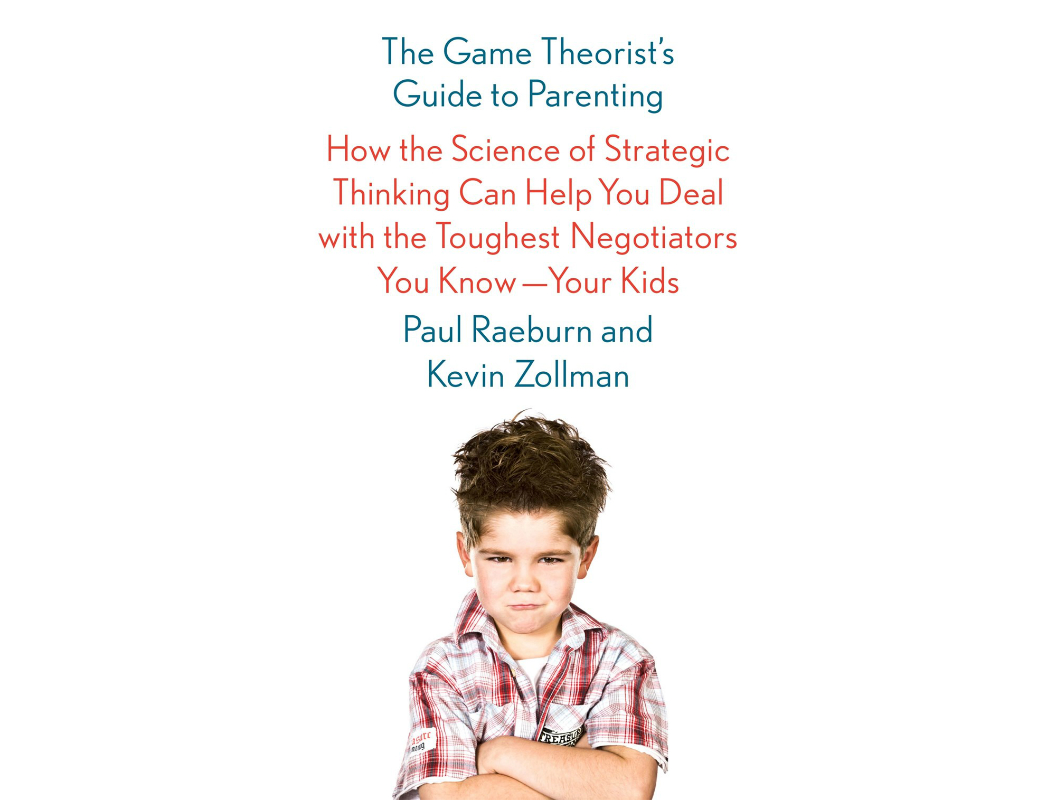How to Use Game Theory to Negotiate with Your Kids: Q&A

Get the world’s most fascinating discoveries delivered straight to your inbox.
You are now subscribed
Your newsletter sign-up was successful
Want to add more newsletters?

Delivered Daily
Daily Newsletter
Sign up for the latest discoveries, groundbreaking research and fascinating breakthroughs that impact you and the wider world direct to your inbox.

Once a week
Life's Little Mysteries
Feed your curiosity with an exclusive mystery every week, solved with science and delivered direct to your inbox before it's seen anywhere else.

Once a week
How It Works
Sign up to our free science & technology newsletter for your weekly fix of fascinating articles, quick quizzes, amazing images, and more

Delivered daily
Space.com Newsletter
Breaking space news, the latest updates on rocket launches, skywatching events and more!

Once a month
Watch This Space
Sign up to our monthly entertainment newsletter to keep up with all our coverage of the latest sci-fi and space movies, tv shows, games and books.

Once a week
Night Sky This Week
Discover this week's must-see night sky events, moon phases, and stunning astrophotos. Sign up for our skywatching newsletter and explore the universe with us!
Join the club
Get full access to premium articles, exclusive features and a growing list of member rewards.
The most expert and ruthless negotiator you can imagine — a tough-talking lawyer, a hard-nosed employer or a cagey building contractor — can't hold a candle to the single-minded maneuvers of a child vying for an extra 15 minutes of TV time or arguing for the right to the biggest slice of birthday cake.
Parenting can often feel like navigating an endless maze of exhausting negotiations that leave all participants feeling frustrated and unsatisfied. But a new book, "The Game Theorist's Guide to Parenting: How the Science of Strategic Thinking Can Help You Deal with the Toughest Negotiators you Know—Your Kids" (Scientific American / Farrar, Straus and Giroux, 2016), suggests that tactics commonly used in business and economics transactions — a framework of strategies known as game theory — could help parents engage with their children with more confidence and success.
Authors Paul Raeburn and Kevin Zollman recently spoke with Live Science about their book, explaining how game-theory principles about conflict resolution and strategic thinking can apply to parenting. Zollman has written extensively about game theory, and Raeburn has written several books about parenting. Together, they offer parents a unique set of guidelines for defusing disagreements by using strategies that encourage the entire family to work together toward a common goal. ["The Game Theorist's Guide to Parenting" (US 2016): Book Excerpt]
(This Q&A has been edited for length and clarity.)
Live Science: How did you both realize that game-theory principles could be applied to parenting?
Paul Raeburn: I think we knew that right from the outset. A lot of what happens between parents and children is negotiations — that's one of the things that game theory is about.
Kevin Zollman: Game theory teaches you to think about problems in a different way, focusing on thinking ahead and having a plan, organizing and thinking about how to approach the problems you have. It provides a systematic way to approach a lot of different parenting problems.
Get the world’s most fascinating discoveries delivered straight to your inbox.
Game theorists always want to think about what game is being played — what are the interests of the various parties, and what are the options that are available to them? What game you're playing makes a big difference in how you approach the situation. Game theory can help parents focus on things that make a difference, and not focus on the things that are superfluous.
Live Science: Could you describe that approach?
Zollman: Game theory says, "Don't just think about what's going to work right now — think two or three steps ahead." There are different chapters where we make that reasoning applicable — like helping your kid to think about, "If I'm mean to my sister, what's my sister going to do to me tomorrow?" But also, as a parent, thinking about, "If I punish my kid by threatening to cancel a family vacation, when it comes time to implement that punishment, is that something I'm going to be willing to do?" That style of thinking can help parents approach parenting dilemmas, even if they're dealing with a situation that we don't explicitly describe in the book.
Raeburn: Most of us know that we should be consistent about punishment: If we decide that a failure to clean up the room means no dessert, then it means no dessert. But we often fail at that. So we all need reasons to know why consistency is important, and game theory explains that.
There's an economics term called "inequity aversion" — a way of saying that we don't like it when things are unfair. At a very early age, 2 or 3, kids are very sensitive to situations in which they get less than their fair share. They throw tantrums, and they yell and scream. They don't mind at all if they get more than their fair share. But when they reach somewhere about age 7, 8 or 9, they begin to develop that other kind of inequity aversion, that other sense of fairness — concern for others — and they start to feel uncomfortable if they get more than their share.
Game theory does a good job of explaining that and helping parents understand that. When your children are very young, they're going to be upset if they get shortchanged. You can't really get mad at a 3- or 4-year-old trying to hustle up more than his share, because he doesn't understand yet that that's not quite right.
Live Science: You mention early on in the book that kids employ strategic thinking to get what they want, "even before they can talk." What makes them such expert negotiators?
Raeburn: Evolution has shaped us to behave in certain kinds of ways, and game theory is a very sophisticated body of knowledge that helps explain that behavior — not only in humans, but in other animals. As kids grow and learn to communicate, they're wired to cooperate, they're wired to be fair — at a certain age — and they're wired to engage in give and take.
Zollman: Kids are focused, especially when they're very young. And they have a lot of time on their hands to think about what they want, while parents have all the different demands of work and social life and extended family. Kids outsmart parents, not because kids are intuitively smarter, but because kids have one thing they're worried about, and parents have many things.
Raeburn: And often, parents are outnumbered! It's not an equal playing field by any means.
Zollman: Our book can help focus that, so parents don't have to spend 4 hours a day figuring out how to outsmart their kids.
Raeburn: The idea that we try to convey with game theory is, here's an interesting way of explaining why being consistent with rewards and with punishment is important. It can help parents come to an agreement about what they can do, and it can make them feel more confident about following through on a strategy.
Live Science: What does game theory — and your book — bring to parenting that might be absent from other approaches?
Raeburn: Many parenting books are based largely on the anecdotal experiences of the people who write them. We're trying to take a broader picture. Our approach is based on evidence, and data and science. We want to cut through the cacophony of parenting books that give you all different kinds of advice, and say, here's a simple, straightforward way that parenting can work, and it's likely to be successful.
Zollman: We're offering a systematic way of approaching parenting. Instead of just giving advice, we're also giving you the reasons and a way to think about them. I think it's really helpful for parents because it helps you to think not just about the circumstances that we tackle but also a whole host of other circumstances — the techniques that the parents see us implementing can be used all over the place.
"The Game Theorist's Guide to Parenting" was published April 5 and may be purchased online.
Follow Mindy Weisberger on Twitter and Google+. Follow us @livescience, Facebook & Google+. Original article on Live Science.

Mindy Weisberger is a science journalist and author of "Rise of the Zombie Bugs: The Surprising Science of Parasitic Mind-Control" (Hopkins Press). She formerly edited for Scholastic and was a channel editor and senior writer for Live Science. She has reported on general science, covering climate change, paleontology, biology and space. Mindy studied film at Columbia University; prior to LS, she produced, wrote and directed media for the American Museum of Natural History in NYC. Her videos about dinosaurs, astrophysics, biodiversity and evolution appear in museums and science centers worldwide, earning awards such as the CINE Golden Eagle and the Communicator Award of Excellence. Her writing has also appeared in Scientific American, The Washington Post, How It Works Magazine and CNN.
 Live Science Plus
Live Science Plus










